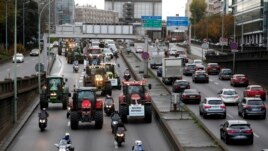04 March 2020
Farmer Jerome Regnault works on a windy day in his fields, just west of Paris. As he looks around the property, he can see it is very different than it was when his grandfather worked the same fields.
Roads and housing developments are moving a lot closer. Technology and international markets are increasingly important to the success of his farm.
French farmers like Regnault say they now have another concern: agri-bashing.

Farmer drive their tractors on the Paris ring road in Paris, France, Nov. 27, 2019.
Agri-bashing is the verbal criticism and sometimes even physical abuse of farmers. Critics accuse them of harming the environment, animals and the health of other people.
"It's become unsupportable," said Regnault. He has not personally been attacked, but knows of friends who have. He says that "worries over agricultural practices" do not justify people attacking farmers and their farms.
As the yearly agricultural show in Paris opened last week, many farmers spoke about their sense of becoming victims.
The show gives French children and their parents a chance to touch farm animals and reconnect with their agricultural past.
A growing farmers' movement now wants to make that connection stronger. Some farmers are putting videos on social media to explain what they are doing. Regnault and a group of farmers launched a telephone hotline for questions and concerns.
"We realized that while farming had a negative image, farmers were seen in a positive light," he said.
His group is called Ici La Terre (Here is Earth).
Hard times for European farmers
Across Europe and on other continents, farmers are under pressure to increase their harvests to feed a growing world population for less cost. Many farmers are also under pressure because of climate change. Now, they are pushing back.
In recent months, farmers and their machinery have stopped traffic in Germany, Spain, Ireland and the Netherlands, among other countries. They have protested such things as feared cuts in European Union aid to farmers, free trade deals and stronger environmental rules.
In France, officials have created pesticide safe areas around communities. They have announced plans to ban the herbicide glyphosate, which kills unwanted plants. Environmentalists say both measures fall short of what is needed. Farmers answered the environmentalists by leaving hay on a major road in Paris.
French President Emmanuel Macron told farmers he would fight in support of the EU's assistance to farmers. He said the money will help them change to more environmentally friendly farming methods.
"It's a policy of the future," Macron said.
Yet some environmentalists say they, not farmers, are under siege.
"We believe agri-bashing doesn't exist," said Marie-Catherine Schulz-Vannaxay. She is an agricultural expert for the group France Nature Environnement. She said that many farmers just do not like being criticized.
For hundreds of years, agriculture controlled the French economy. Today, less than three percent of workers are involved with agriculture. About 20 percent of farmers live in poverty and their suicide rates are higher.
Ici La Terre
Some farmers are, in fact, changing. A new report finds about 10 percent of them are growing organic products.
Organic farming and other issues are discussed on the farming hotline. Launched in September, Ici La Terre now counts 130 farmers.
"We're not trying to convince people, just to explain what we do and exchange," Regnault said.
I'm Susan Shand.
VOA's Lisa Bryant reported this story. Susan Shand adapted it for VOA Learning English. George Grow was the editor.
Write to us in the Comments Section or on 51VOA.COM.
________________________________________________________________
Words in This Story
practices – n. the action of doing or using something
hotline – n. a telephone service for the public to use to get help in emergencies
negative – adj. thinking about the bad qualities of someone or something
positive – adj. thinking about the good qualities of someone or something
pesticide – n. a chemical that is used to kill animals or insects that damage plants or crops
hay – n. grass that has been cut and dried to be used as food for animals
organic – adj. grown or made without the use of artificial chemicals
convince – v. to cause (someone) to believe that something is true